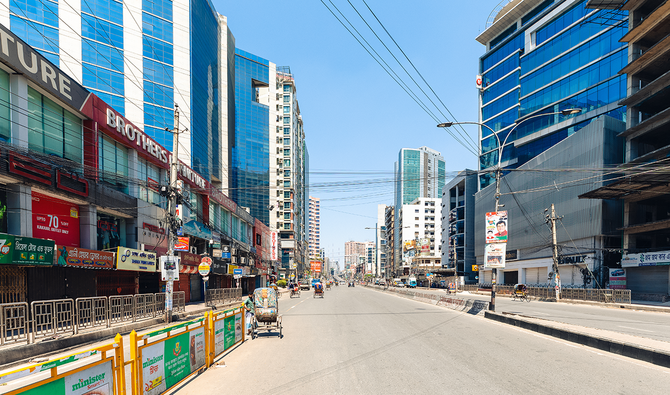DHAKA: Mostak Ahmed had his bags packed and was ready to fly to Saudi Arabia in February this year after securing work in the Kingdom.
But six months on, the resident of Bangladesh’s Munshiganj district told Arab News on Wednesday that instead he is struggling to pay off money that he borrowed to finance his move.
“I borrowed $4,000 from a local organization at high interest and was set to fly to Saudi Arabia to work as a cleaner. But now I am repaying the loan instalments without earning a penny.
“I have had to borrow money from relatives. I don’t know how long I can survive like this,” Ahmed said.
He said the coronavirus pandemic has not only “crushed his dreams” of a better future abroad, but also left him without work at home.
Ahmed is among almost 100,000 aspiring Bangladeshi migrant workers stuck in limbo and facing an uncertain future due to the outbreak and travel bans imposed by most countries.
Bangladesh is one of the main labor sources for the Gulf and the Middle East, while more than 10 million workers are employed across the world.
According to the Bangladesh Manpower Employment and Training Authority, the country sent more than 180,000 migrant workers to several countries between January and March this year, including 130,000 to Saudi Arabia — the destination of choice for Bangladeshi migrant workers.
Many aspiring migrants said they had either sold their properties or borrowed money, hoping to repay the loan when they began working overseas.
Abdul Hannan, a resident of the Noakhali district, said he sold the last piece of his ancestral land for $5,000 to secure work in the UAE.
“My flight was supposed to be in the first week of April. But now everything is uncertain as my employer asked me to stay at home for few more weeks because the business is not going well,” Hannan told Arab News, adding that he is unsure what will happen “if ultimately I can’t fly to the UAE.”
He is not alone.
Shamim Ahmed Chowdhury Noman, secretary-general of the Bangladesh Association of International Recruiting Agencies, said more than 85,000 aspiring migrants are in a similar situation.
“Most of these workers are facing severe hardship after arranging money to travel overseas. They can’t wait for an indefinite period shouldering a huge debt,” Noman told Arab News.
He added that the best solution will be to refund workers to help ease their financial stress.
“These workers should be repaid the money if they can’t fly soon. But our members can’t do so as they have already spent the money. We have urged the government to provide soft loans for industry operators,” he said.
The Bangladesh government said it is maintaining contact with host countries so aspiring migrants can begin work as soon as the pandemic is under control.
Jahangir Alam, joint secretary of the Expatriates Welfare and Overseas Employment Ministry, told Arab News the response has been “positive.”
“We are receiving positive responses from the UAE and Qatar regarding our migrants. We hope to receive a good response from Saudi Arabia as soon as they overcome the pandemic situation,” he added.
Shariful Hasan, head of Bangladeshi NGO BRAC’s migration program, suggested the government take extraordinary measures to ease the plight of migrants.
“Those who have already paid money to join a job overseas should take priority as soon as the situation returns to normal,” he said.
Bangladesh’s economy has taken a battering since the start of the pandemic with a fall in remittances, the second-largest source of revenue worth more than $18 billion last year.

























